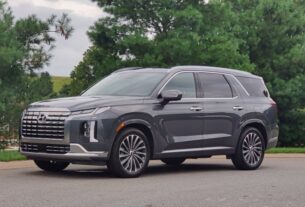By Sean Tucker
- Edmunds Experts Forecast 14.8 Million New Vehicles Will Be Sold in New Year
- Car Buying in a Topsy-Turvy Market
- If you bought a car last year, it could now be worth more than you paid for it
- Crew Cab vs Quad Cab vs King Cab: What’s the Difference?
- California’s Southern Region Is Home to the Largest Car Dealership in the World
EVs experienced more problems than gas-powered cars-79% more. And plug-in hybrids were worse.
New technologies tend to be less reliable than proven technologies. But the Consumer Reports’ 2023 Auto Reliability Survey headline is still jarring. “On average, new electric vehicles have 79% more problems than Internal Combustion Engine (ICE) vehicles,” CR reports.
Plug-in hybrids, the halfway point between the two capable of using electricity for short trips and gas for long trips, performed even worse in the survey. Those, CR says, have 146% more problems than ICE vehicles.
Consumer Reports’ approach is unique
Consumer Reports’ rankings differ from most automotive reliability studies because CR polls its members. This has advantages and disadvantages.
Only a certain kind of consumer subscribes to a publication that exists to study reliability and sound buying decisions. That may leave some brands overrepresented and others nearly absent from CR’s poll.
But the data is extensive for the cars it does represent. Laws give automakers the right to opt out of studies in some states, but the nature of CR’s surveys gets around that problem. Tesla (TSLA), which famously refuses to participate in many quality studies, appears in CR’s results.
The magazine asks its members to report problems they’ve had with their cars in the last 12 months. It only reports results for vehicles from model years 2001 through 2024. This year, it studied more than 330,000 individual vehicles.
Nearly every automaker did better than last year.
Lexus, Toyota did very well
Of the top 10 most reliable brands, seven are headquartered in Asia, with Lexus and Toyota in the top two spots, CR says. Every Lexus model but one – the NX – had above-average reliability.
The aging Toyota (TM) 4Runner – last redesigned for the 2009 model year – was the most reliable vehicle in the survey.
Check out: Toyota is making this new SUV with the Crown name: When can you get one?
The scores:
Brand Score (0-100 point scale) Toyota 79 Lexus 76 Mini 71 Acura 70 Honda 70 Subaru 69 Mazda 67 Porsche 66 BMW 64 Kia 61 Hyundai 56 Buick 55 Infiniti 53 Tesla 48 Ram 46 Cadillac 45 Nissan 45 Genesis 44 Audi 43 Chevrolet 43 Dodge 42 Ford 40 Lincoln 38 GMC 36 Volvo 28 Jeep 26 Volkswagen 26 Rivian 24 Mercedes-Benz 23 Chrysler 18
Newness, complexity are issues
There’s a lesson in the 4Runner’s strong score. It may even explain the EV results.
Cars are complex machines. It takes time for automakers to find all the flaws in a design and correct them. “And as our data has consistently shown, reliability-minded consumers would be best served by forgoing brand new vehicles in their first model year,” explains Jake Fisher, senior director of auto testing for CR.
That same logic applies not just to individual models but to technologies.
CR calls the troubling scores of EVs “growing pains.”
With well-established batteries and electric motors that have been on the market for years now, Tesla has “issues with body hardware, paint and trim, and climate system on its models.”
Other EV builders working with the technology for less time “had fewer reported problems related to build quality, but higher rates of powertrain, battery, and charging issues,” CR explains.
And plug-in hybrids, with essentially two powertrains, take more time to perfect. More parts mean more things that can go wrong.
Hybrids a bright spot
EVs and PHEVs experienced more problems than gas-powered cars in CR’s survey. Hybrids experienced less.
On average, hybrids are 26% more reliable than vehicles with only an internal combustion engine, CR explained.
“This is because hybrid technology is now over 25 years old and is offered mainly from the most reliable automakers,” Fisher says.
Hybrid sales have been rising throughout 2023 as many Americans seek a way to save on gasoline without tying themselves to a new technology experiencing growing pains.
This story originally ran on KBB.com. Cox Automotive, the parent company of Kelley Blue Book and Autotrader, is a minority investor in Rivian.
-Sean Tucker
This content was created by MarketWatch, which is operated by Dow Jones & Co. MarketWatch is published independently from Dow Jones Newswires and The Wall Street Journal.
(END) Dow Jones Newswires
12-04-23 0504ET
See more : Crew Cab vs Quad Cab vs King Cab: What’s the Difference?
Copyright (c) 2023 Dow Jones & Company, Inc.
Source: https://us.congthucvatly.com
Category: Car



